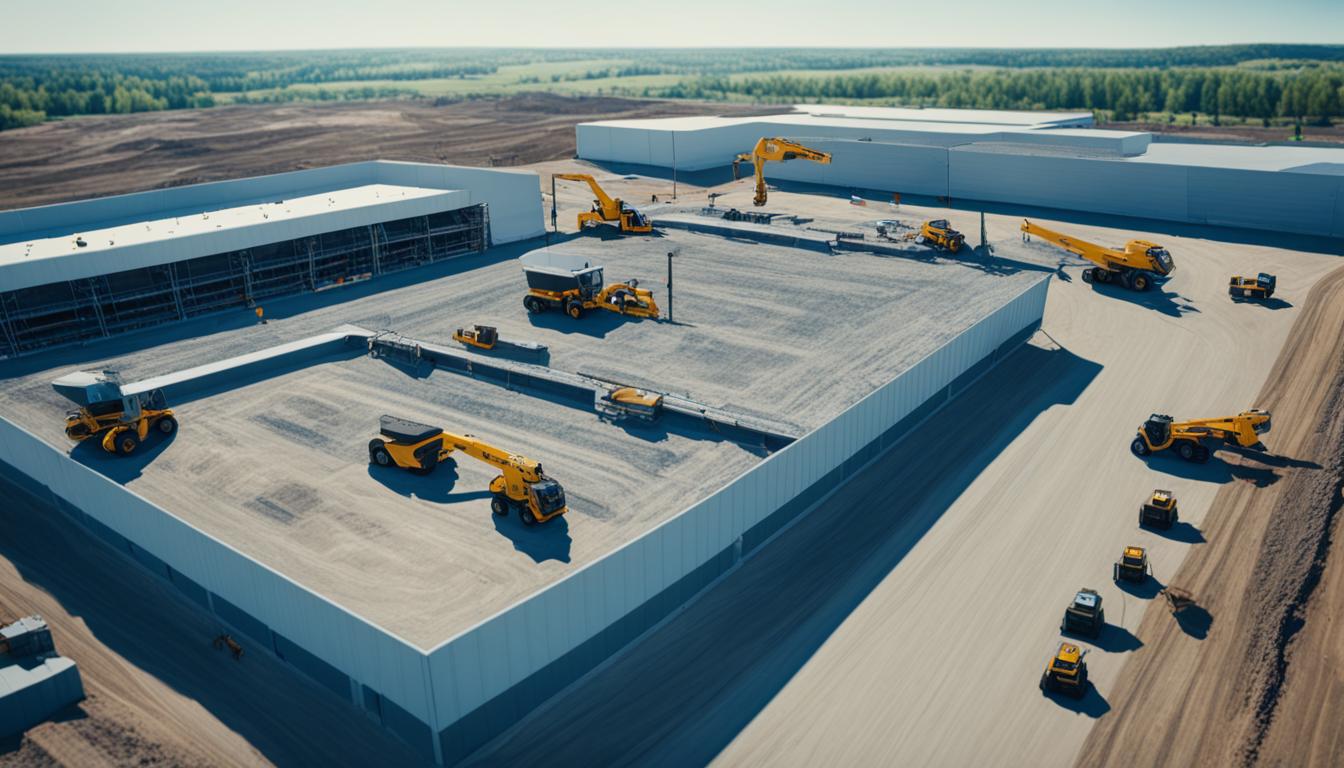The construction industry is increasingly turning to Artificial Intelligence (AI) to improve project management processes. With the rapid advancements in AI technology, it has the potential to revolutionize the way construction projects are planned, executed, and managed. AI applications in construction can enhance efficiency, increase productivity, and drive innovation in the industry. By leveraging AI-powered tools and solutions, construction companies can overcome challenges such as cost overruns, schedule delays, and labor shortages. The integration of AI in construction project management is transforming the industry and paving the way for digital transformation and smart construction solutions.
Key Takeaways:
- AI technology is revolutionizing construction project management processes.
- AI applications in construction improve efficiency, productivity, and innovation.
- AI-powered tools help overcome challenges like cost overruns and labor shortages.
- Integrating AI in construction project management drives digital transformation and smart construction solutions.
- The construction industry can leverage the power of AI to enhance project performance and success.
Understanding Artificial Intelligence and Machine Learning in Construction
Artificial Intelligence (AI) is a broad term that encompasses machines or systems that simulate human cognitive functions, such as problem-solving, pattern recognition, and learning. Machine Learning (ML) is a subset of AI that utilizes statistical techniques to enable computers to learn from data without explicit programming. In the construction industry, AI and ML technologies are revolutionizing project management processes and driving innovation.
AI in construction allows for the automation of repetitive tasks and the analysis of large datasets to uncover valuable insights. By leveraging AI-powered algorithms, project managers can monitor project progress, analyze data from multiple sources, and identify risks or inefficiencies in real-time. This enables them to make informed decisions and take proactive measures to optimize project performance.
One example of AI’s application in construction is the use of smart sensors and drones to collect and analyze data on construction sites. These data-driven insights can help identify potential safety hazards, optimize resource allocation, and improve overall project efficiency. AI also enables virtual and augmented reality simulations, enhancing project visualization and communication with stakeholders.
Machine Learning, as a subset of AI, plays a crucial role in construction as well. ML algorithms can learn from historical project data to predict and optimize project outcomes. By analyzing patterns and correlations in the data, ML can provide valuable insights for decision-making and help project managers improve project planning and execution.
“Artificial Intelligence and Machine Learning have immense potential to transform the construction industry by automating tasks, analyzing data, and optimizing project outcomes.”
With the integration of AI and ML technologies, the construction industry is experiencing a paradigm shift towards digital transformation and smart construction solutions. These technologies offer improved efficiency, productivity, and quality in project management, enabling construction companies to stay competitive in a rapidly evolving industry.
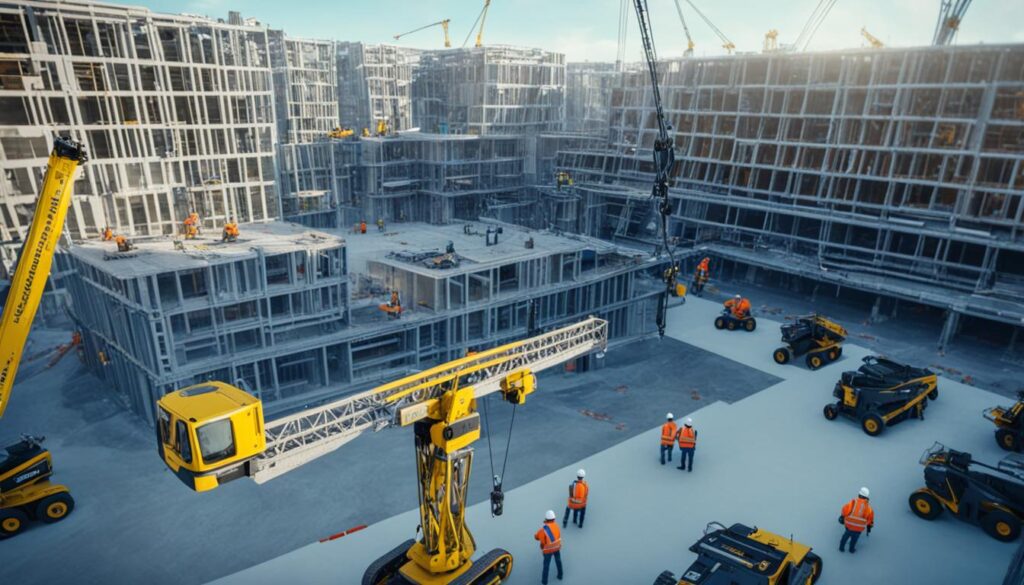
Benefits of AI and ML in Construction
The utilization of AI and ML in construction provides several key benefits:
- Automating repetitive tasks: AI technology can automate mundane tasks such as data entry, form filling, and report generation, freeing up valuable time for project managers to focus on strategic activities.
- Enhancing decision-making: By analyzing large datasets and uncovering patterns and insights, AI and ML empower project managers to make informed decisions, identify risks, and optimize project outcomes.
- Improving project efficiency: AI-driven tools enable the monitoring of project progress in real-time, allowing project managers to identify and address inefficiencies promptly. This leads to increased efficiency and timely completion of construction projects.
- Optimizing resource allocation: By analyzing historical project data, AI and ML can optimize resource allocation, ensuring that materials, equipment, and manpower are utilized efficiently.
- Enhancing safety and quality control: AI-powered cameras, sensors, and algorithms can monitor construction sites for safety hazards, enabling proactive measures to be taken to prevent accidents and improve overall safety. AI also improves quality control by analyzing data and identifying potential flaws or defects.
These benefits demonstrate the significant impact that AI and ML technologies have on construction project management. By leveraging these advanced tools, construction companies can streamline processes, minimize risks, and achieve higher levels of project success.
Benefits of AI in Construction Project Management
AI applications in construction bring numerous benefits to project management, enhancing efficiency, productivity, and decision-making. Through the automation of repetitive tasks, construction project managers can focus on more strategic and high-value activities, driving project success.
AI also enables the use of virtual and augmented reality simulations, revolutionizing project visualization and communication with stakeholders. These technologies provide a more immersive and interactive experience, improving collaboration and understanding.
With its advanced analytics capabilities, AI can analyze vast amounts of data and identify potential risks or areas for improvement in real-time. By monitoring construction sites for safety hazards, improving quality control, and optimizing resource allocation, AI-powered tools support project managers in maintaining a safe and productive work environment.
Here is a summary of the key benefits of AI in construction project management:
- Automation of Repetitive Tasks: AI frees up project managers from tedious and time-consuming tasks such as data entry, form filling, and report generation. This allows them to focus on more critical aspects of project management.
- Enhanced Project Visualization: Through virtual and augmented reality simulations, AI facilitates a better understanding of project plans, enabling stakeholders to visualize the final outcome more accurately.
- Predictive Analytics and Risk Management: AI’s data analysis capabilities help identify potential risks and areas for improvement, allowing project managers to take proactive measures and mitigate potential issues.
- Safety Hazard Monitoring: AI-powered tools can monitor construction sites for safety hazards, minimizing the risks to workers and ensuring compliance with safety regulations.
- Improved Quality Control: AI can analyze data to identify deviations from quality standards and enable proactive quality control measures, ensuring that project deliverables meet the required specifications.
- Optimized Resource Allocation: By utilizing AI algorithms, project managers can optimize the allocation of resources, such as labor, equipment, and materials, resulting in improved cost-efficiency and resource utilization.
Overall, AI empowers construction project managers with advanced tools and insights to streamline processes, enhance project efficiency, and drive successful outcomes.
Testimonials
“Implementing AI in our construction projects has revolutionized our project management process. The automation of repetitive tasks and the use of virtual and augmented reality simulations have significantly improved efficiency and collaboration within our team.”
“With AI-powered analytics, we can proactively identify potential risks and make data-driven decisions, which has led to improved project outcomes and client satisfaction.”
| Benefits | Description |
|---|---|
| Automation of Repetitive Tasks | AI frees project managers from time-consuming tasks, enabling them to focus on critical activities. |
| Enhanced Project Visualization | Virtual and augmented reality simulations provide stakeholders with a better understanding of project plans. |
| Predictive Analytics and Risk Management | AI’s data analysis capabilities help identify potential risks and areas for improvement in real-time. |
| Safety Hazard Monitoring | AI-powered tools monitor construction sites for safety hazards, ensuring compliance with safety regulations. |
| Improved Quality Control | AI can analyze data to identify deviations from quality standards, enabling proactive quality control measures. |
| Optimized Resource Allocation | AI algorithms optimize the allocation of resources, improving cost-efficiency and resource utilization. |
Limitations of AI in Construction Project Management
While AI offers significant benefits to the construction industry, it is important to understand its limitations in project management. These limitations can impact the effectiveness and reliability of AI systems, and it is crucial to consider them when implementing AI technologies. Some of the key limitations of AI in construction project management include:
Lack of Context and Understanding
AI systems may struggle to fully grasp the intricacies and nuances of construction projects and sites. They may not have the contextual understanding required to make accurate decisions or recommendations. This limitation can hinder the ability of AI to effectively support project management processes.
Data Quality Issues
Construction projects generate vast amounts of unstructured data, making data quality a major concern. Inaccurate or biased data can lead to unreliable outputs from AI systems. Ensuring the accuracy and reliability of the data inputs is crucial to optimizing the performance of AI algorithms.
High Implementation Cost
Implementing AI technologies in construction project management can require substantial investments in technology infrastructure and expertise. The cost of acquiring and integrating AI solutions can be a barrier for some construction companies, limiting their ability to leverage AI’s potential.
Dependence on Technology
AI systems can create a reliance on technology, which introduces the risk of malfunctions or failures. Construction projects need to have contingency plans in place to address these potential issues and maintain project continuity and productivity.
Handling Unexpected Situations
AI algorithms may not always be agile in handling unexpected situations or Black Swan events that deviate from the norm. The rigid nature of AI systems can make them less adaptable to unforeseen circumstances, emphasizing the need for human intervention and decision-making.
While acknowledging these limitations, it is important to remember that AI can still provide valuable support in construction project management. Understanding the limitations helps project managers effectively utilize AI technologies and leverage human intelligence to complement the capabilities of AI.
| Limitations | Impact |
|---|---|
| Lack of Context and Understanding | Can hinder accurate decision-making |
| Data Quality Issues | Unreliable outputs, affecting project performance |
| High Implementation Cost | Potential barrier for some construction companies |
| Dependence on Technology | Risk of malfunctions or failures |
| Handling Unexpected Situations | Limited adaptability to unforeseen circumstances |
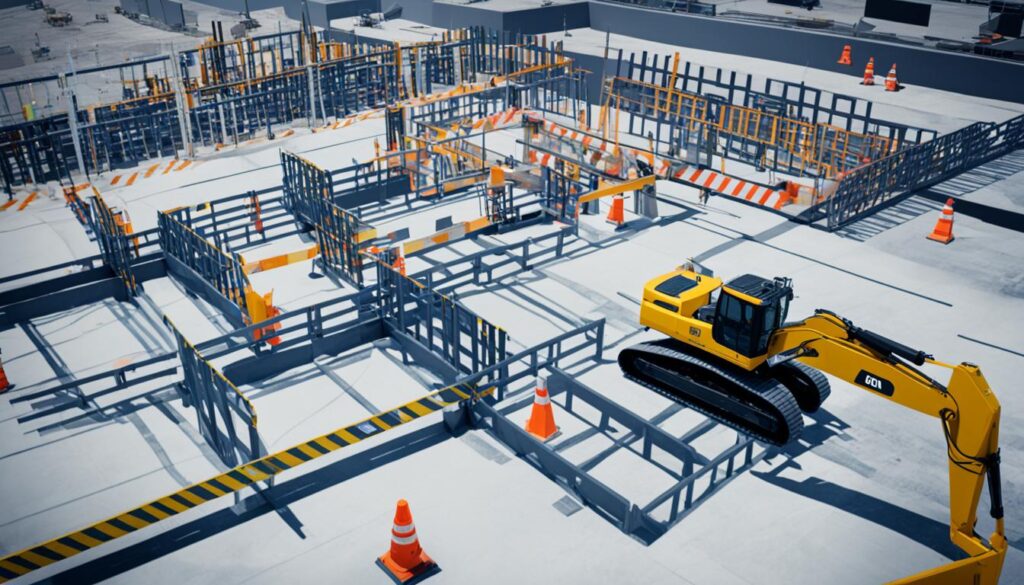
Despite these limitations, AI continues to advance and holds great potential for the construction industry. By understanding and addressing its limitations, construction companies can better harness the power of AI in project management.
AI and Preconstruction Project Stages
Artificial Intelligence (AI) has become an indispensable tool in construction, especially during preconstruction stages. Its ability to analyze data, simulate scenarios, and automate processes makes it invaluable in enhancing efficiency, improving decision-making, and optimizing project outcomes. Let’s explore how AI proves beneficial in the various phases of preconstruction.
Pre-Design Phase
In the pre-design phase, AI facilitates feasibility studies, risk analysis, and project understanding by utilizing virtual and augmented reality simulations. By visualizing the project in a virtual environment, stakeholders can gain better insights, evaluate potential challenges, and make informed decisions. This technology-driven approach improves collaboration, reduces errors, and promotes cost-effective planning.
Design Development
AI plays a crucial role in optimizing the efficiency and quality of design during the design development phase. Through generative design tools, AI can propose multiple design options based on given parameters, constraints, and optimization goals. This technology empowers architects and engineers to explore innovative design solutions, accelerating the design process, and ensuring optimal project outcomes.
Construction Documents
When it comes to the construction documents phase, AI can automate the processing of data from construction documents. By leveraging natural language processing and machine learning algorithms, AI systems can extract information from documents, improving accuracy and saving time. This automation reduces the risk of manual errors and enables project teams to focus more on critical tasks that require human expertise.
Bidding and Negotiation
AI also plays a significant role in streamlining the bidding and negotiation processes. It can automate tasks like takeoffs and estimating, enabling contractors to generate accurate and competitive bids efficiently. Additionally, AI can validate building code compliance during permitting and approvals, ensuring adherence to regulations and standards.
Enhancing Decision-Making, Efficiency, and Quality
Overall, AI enhances decision-making, efficiency, and quality in preconstruction project stages. By leveraging AI technologies, construction professionals can make data-driven decisions, optimize resource allocation, mitigate risks, and improve project outcomes. The integration of AI in the preconstruction phase sets the stage for successful project execution and lays the foundation for a streamlined construction process.
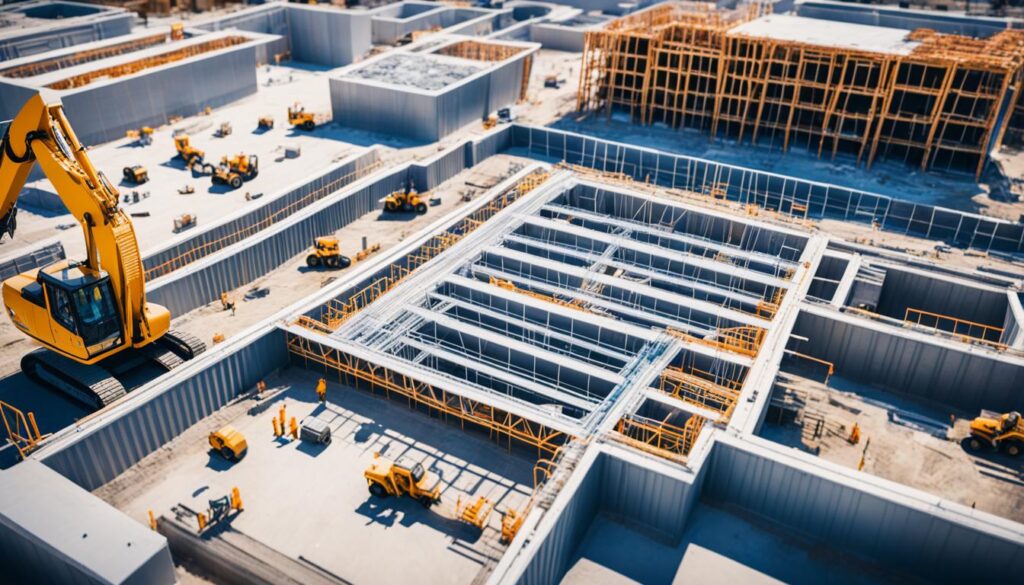
AI in Other Areas of Construction
Aside from project management, AI is revolutionizing various other areas of construction, driving innovation and optimizing processes. Let’s explore two key domains where AI is making significant strides: construction safety and robotics.
AI in Construction Safety
Ensuring the safety of workers and minimizing hazards on construction sites is of paramount importance. AI-powered cameras and sensors play a crucial role in enhancing construction safety. These intelligent devices monitor job sites in real-time, analyzing data to identify and alert workers and managers about potential dangers. By leveraging AI in construction safety, companies can proactively address safety issues, reduce accidents, and create safer working environments.
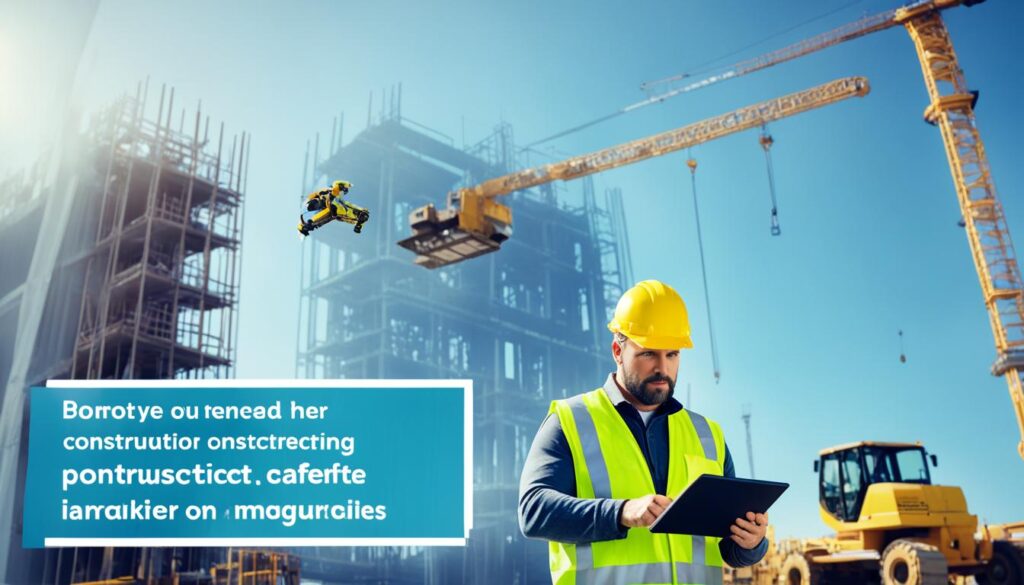
Robotics in Construction
Robotics, empowered by AI, is transforming the construction landscape by automating manual tasks and optimizing efficiency. Autonomous machinery, guided by AI algorithms, is capable of performing complex construction operations like bricklaying, welding, and even 3D printing. These robotic systems not only speed up construction processes but also enhance precision and quality, reducing human error and improving overall project outcomes.
The integration of AI in robotics is revolutionizing how construction projects are executed, pushing the boundaries of what is possible and paving the way for incredible advancements in the industry.
AI and Predictive Maintenance
Another area where AI is making a significant impact in construction is predictive maintenance. By analyzing data from building systems, AI-powered software can detect patterns and anomalies, predict potential equipment failures, and trigger proactive maintenance activities. This approach minimizes downtime, prolongs the lifespan of critical equipment, and reduces maintenance costs. With AI-driven predictive maintenance, construction companies can ensure the optimal performance and longevity of their assets.
Conclusion
AI holds tremendous potential to revolutionize construction project management, offering significant benefits such as improved efficiency, cost reduction, and enhanced project success. Through automation, virtual and augmented reality simulations, predictive analytics, and resource optimization, AI empowers the construction industry to overcome challenges and drive innovation.
However, it is crucial to acknowledge the limitations of AI and the irreplaceable role of human skills in project management. While AI can enhance decision-making and efficiency, human leadership, problem-solving, and creative thinking remain essential for project success. The ethical and responsible integration of AI into construction project management ensures that it complements and enhances human-led processes.
By leveraging the power of AI alongside human expertise, the construction industry can embrace digital transformation and propel innovation in project management. With a harmonious collaboration between AI and human skills, we can harness the full potential of technology to optimize construction processes and deliver successful projects.
FAQ
What is Artificial Intelligence (AI) and how does it relate to construction project management?
Artificial Intelligence refers to machines or systems that mimic human cognitive functions. In construction project management, AI technology is used to automate tasks, analyze data, and improve decision-making.
What are the benefits of AI in construction project management?
AI offers several benefits in construction project management, including the automation of repetitive tasks, enhanced project visualization through virtual and augmented reality simulations, predictive analytics for risk management, and optimized resource allocation.
What are the limitations of AI in construction project management?
Some limitations of AI in construction project management include the lack of context and understanding, data quality issues, implementation costs, and potential dependence on technology.
How does AI impact preconstruction project stages?
AI plays a significant role in preconstruction project stages by assisting with feasibility studies, risk analysis, project understanding through virtual and augmented reality simulations, optimizing design efficiency using generative design, automating data processing, streamlining bidding and negotiation processes, and validating building code compliance.
In which other areas of construction is AI being applied?
AI is being applied in construction safety through AI-powered cameras and sensors, robotics for tasks like bricklaying and welding, and predictive maintenance to prevent equipment failure. AI and big data analysis are also used to facilitate better decision-making and performance across different aspects of the construction industry.
Can AI replace human skills in construction project management?
No, AI cannot replace human skills in construction project management. While AI enhances decision-making and efficiency, human leadership, problem-solving, and creative thinking remain essential for project success. AI should be integrated ethically and responsibly to complement and enhance human-led processes.

